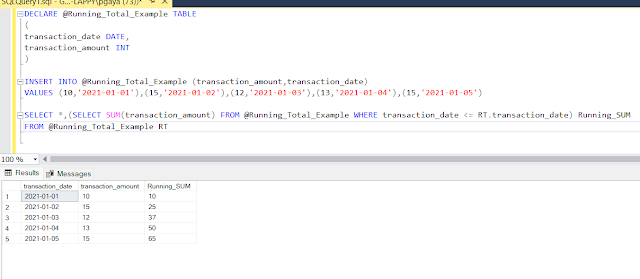What is running sum ?
Running sum is basically sum of all previous rows till current row for a given column. The rows can be ordered/indexed on certain condition while collecting the sum.
Below is the example where we collect running sum based on transaction time (datetime field)
On Running_Sum column you can notice that its sum of all rows for every row.
How can you obtain running sum in SQL ?
Using SQL windowing function
We will create a table with transaction data as shown above and try to obtain running sum.
Syntax for running total
SUM(<COLUMN>) OVER (PARTITION BY <COLUMN(S)> ORDER BY <COLUMN(S))
Since in our example we don't have any group to get running total so we will not use PARTITION BY.
Lets jump into example
Below you can copy the code for above example.
DECLARE @Running_Total_Example TABLE
(
transaction_date DATE,
transaction_amount INT
)
INSERT INTO @Running_Total_Example (transaction_amount,transaction_date)
VALUES (10,'2021-01-01'),(15,'2021-01-02'),(12,'2021-01-03'),(13,'2021-01-04'),(15,'2021-01-05')
SELECT *,SUM(transaction_amount) OVER(ORDER BY transaction_date) AS Running_SUM FROM @Running_Total_Example ORDER BY transaction_date
Running sum by correlated subquery
We can obtain the running total using correlated subquery. We use the query if we do not have option of windowing function/clause to get running sum.
You can copy the code from below.
DECLARE @Running_Total_Example TABLE
(
transaction_date DATE,
transaction_amount INT
)
INSERT INTO @Running_Total_Example (transaction_amount,transaction_date)
VALUES (10,'2021-01-01'),(15,'2021-01-02'),(12,'2021-01-03'),(13,'2021-01-04'),(15,'2021-01-05')
SELECT *,(SELECT SUM(transaction_amount) FROM @Running_Total_Example WHERE transaction_date <= RT.transaction_date) Running_SUM
FROM @Running_Total_Example RT



